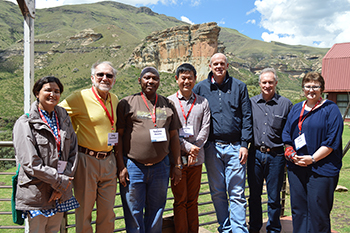Latest News Archive
Please select Category, Year, and then Month to display items
08 April 2021
|
Story Thabo Kessah
|
Photo UFS Photo Archive
 Dr KPD Maphalla with former UFS Chancellor, Dr Franklin Sonn, during the graduations in April 2007.
Dr KPD Maphalla with former UFS Chancellor, Dr Franklin Sonn, during the graduations in April 2007.
The University of the Free State is sad to learn of the passing of alumnus and award-winning Sesotho literary giant, Dr KPD Maphalla.
The literary works of Dr Khotso Pieter David Maphalla, like many other African writers and artists, were influenced and characterised by his own era of powerful forms of oppression and exclusion from dominant literary discourses. In his own right and through his writings of poetry, novels, short stories, and kodiamalla (dirge), he articulated a deliberate political and social protest and pushed for a place for African languages in literature at the height of apartheid.
“He entered the professional scene with his ground-breaking novel, Kabelwamanong, in 1982 at the age of 27. His career actually started in 1971 while he was still at school. Since his first novel, he has produced at least two books annually, covering the genres of poetry, novels, dramas, and short stories. As a dramatist, Dr Maphalla has written a number of excellent and educative radio dramas for the then Radio Sesotho (now Lesedi FM),” said his long-time friend and Head: African Languages at the University of the Free State, Dr Nyefolo Malete.
“It was for this writing prowess that he received recognition from the UFS when he was awarded an Honorary Doctorate in Literature by the Department of African Languages during a momentous ceremony on the Qwaqwa Campus in 2007,” added Dr Malete.
Dr Malete also revealed that, despite losing the use of his right hand after suffering a stroke following a car accident in the late 1990s, Dr Maphalla continued writing using his left hand. “He was adamant that, what he referred to as his ‘supposed disability’, would not deter his passion for writing.”
Dr Maphalla’s work has also produced numerous scholarly studies by the likes of Profs Moleleki Moleleki (protest poetry), Thapelo Selepe (lament and protest poetry), and Dr Seema Seema (process of cross-cultural communication). He was a committed Qwaqwa community member, who was also instrumental in the founding of Qwaqwa Community Radio (2000) and Metjodi Writers (2006), among others. He has written more than 70 books, many of which have been prescribed texts in schools.
Some of the awards he has won include:
South African Centre for Digital Language Resource (SADiLar) Sesotho Lexicographic Unit (Sesiu sa Sesotho) Lifetime Award for outstanding literary works and for promoting Sesotho literature (2019).
The Literature Festival and the University of the Free State Award for enormous contribution to Sesotho literature by a South African writer (2019).
Lifetime Achiever Award in Literature awarded by the Department of Arts and Culture (2005).
M-Net Book Prize for Sesotho poetry (2005). The first and thus far the only Sesotho author to have received this honour.
M-Net Book Prize for best novel (1996).
De Jager-HAUM Literary Award for his volume of short stories, Mohlomong Hosane (1993).
Thomas Mofolo Trophy for Best Novel, Best Poetry, and the Overall Award (1992).
Thomas Mofolo Trophy for Best Poetry (1991).
Dr JJ Moiloa Floating Trophy for Best Sesotho Poetry Book of the Year, Kgapa tsa ka (1985).
Young researchers shine during the international Afromontane Colloquium
2017-07-18

From the left, are: Drs Reetu Sogani (India),
Greg Greenwood (US-Switzerland), Teboho Manchu,
Acting Campus Principal, Drs Jianchu Xu (China),
Henri Rueff (Switzerland), Glen Taylor, Senior Director:
Research Development; and Dr Elsa Crause,
Campus Vice-Principal: Academic and Research.
Photo: Thabo Kessah
The University of the Free State’s Afromontane Research Unit (ARU), which is situated on the Qwaqwa Campus, has the potential to produce some of the world’s best and dynamic young researchers. This is the view shared by Drs Henri Rueff and Reetu Sogani, who were the keynote speakers during the ARU Colloquium hosted at Golden Gate in the Eastern Free State.
Dr Rueff, a geographer and environmental economist from the Universities of Basel and Bern in Switzerland, was referring to no less than ten Qwaqwa Campus postgraduate students who made oral and poster presentations during the inaugural international colloquium.
Colloquium an opportunity to interact
“You have some of the world’s most motivated and highly skilled students who have the courage to stand in front of extremely critical scientists from all over the globe – and that must be commended,” he said.
Dr Reetu Sogani from India said that her first trip to South Africa did not disappoint. “This colloquium was a very good learning experience for me as I had the opportunity to interact with brilliant and young scientists from this part of the world,” she added.
In closing the colloquium, the Senior Director: Research Development, Dr Glen Taylor, committed the UFS to the success of the unit.
“The ARU will strengthen the research output of the campus. But most important of all, it is setting the research agenda for the Qwaqwa Campus, and for the institution at large, to address the challenges that the surrounding mountain communities are faced with,” he said.